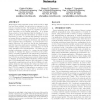Free Online Productivity Tools
i2Speak
i2Symbol
i2OCR
iTex2Img
iWeb2Print
iWeb2Shot
i2Type
iPdf2Split
iPdf2Merge
i2Bopomofo
i2Arabic
i2Style
i2Image
i2PDF
iLatex2Rtf
Sci2ools
118
click to vote
SENSYS
2003
ACM
2003
ACM
CODA: congestion detection and avoidance in sensor networks
Event-driven sensor networks operate under an idle or light load and then suddenly become active in response to a detected or monitored event. The transport of event impulses is likely to lead to varying degrees of congestion in the network depending on the sensing application. It is during these periods of event impulses that the likelihood of congestion is greatest and the information in transit of most importance to users. To address this challenge we propose an energy efficient congestion control scheme for sensor networks called CODA (COngestion Detection and Avoidance) that comprises three mechanisms: (i) receiver-based congestion detection; (ii) open-loop hop-by-hop backpressure; and (iii) closed-loop multi-source regulation. We present the detailed design, implementation, and evaluation of CODA using simulation and experimentation. We define two important performance metrics (i.e., energy tax and fidelity penalty) to evaluate the impact of CODA on the performance of sensing ...
Related Content
| Added | 05 Jul 2010 |
| Updated | 05 Jul 2010 |
| Type | Conference |
| Year | 2003 |
| Where | SENSYS |
| Authors | Chieh-Yih Wan, Shane B. Eisenman, Andrew T. Campbell |
Comments (0)

